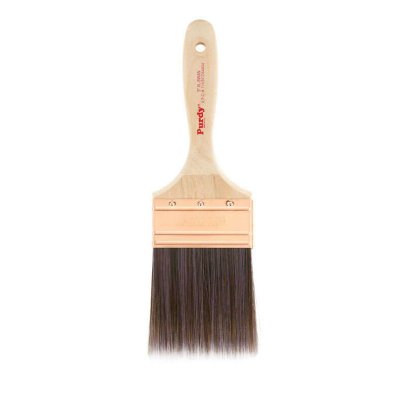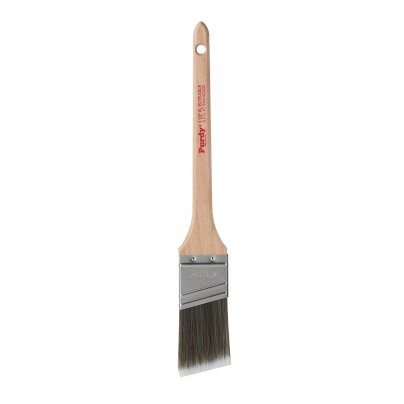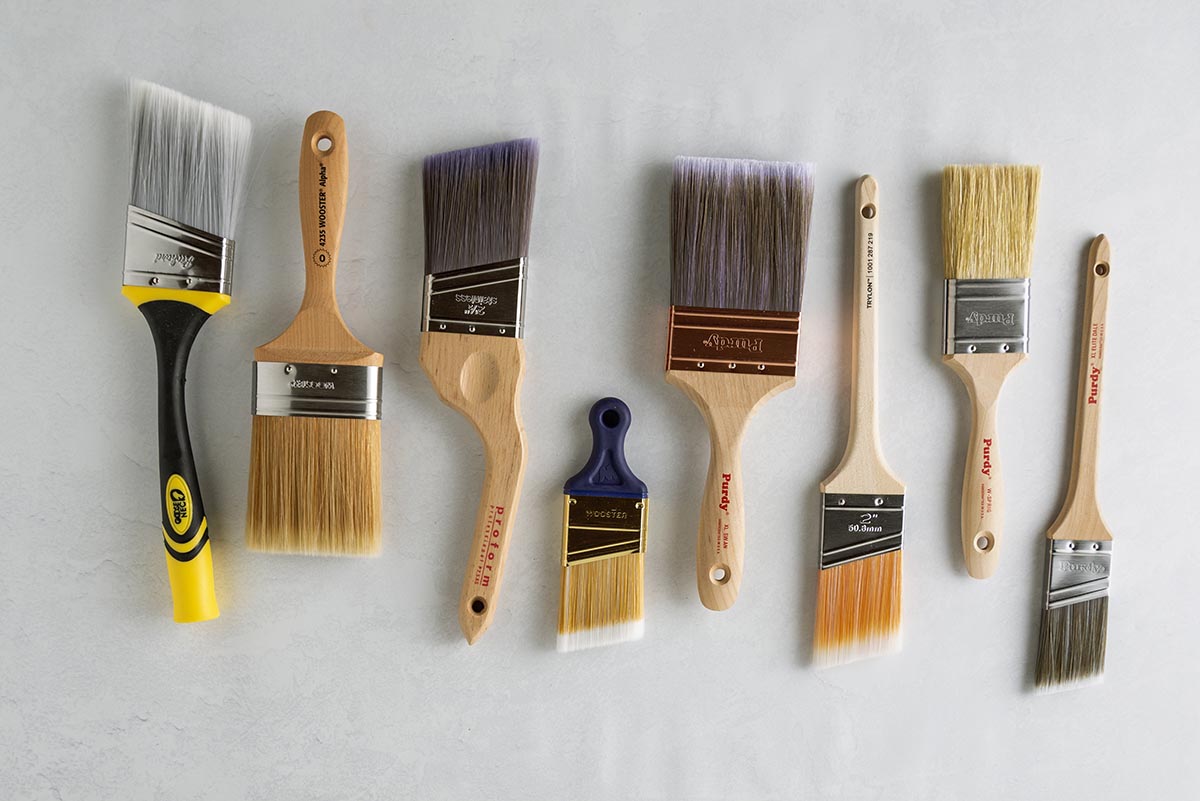
We may earn revenue from the products available on this page and participate in affiliate programs. Learn More ›
Choosing colors for your next paint project can really occupy your time as you pore over a spectrum of shade swatches. Yet to achieve smooth, complete, precise coverage, you’ll need to put a bit of thought into your brushes as well.
While many DIYers opt for rollers on large surfaces like walls, a brush provides greater precision while using less paint. It also provides more versatility, as brushes are able to create both smooth and textured finishes, depending on your technique. And you’ll rely on brushes for trim and other detail work, as well as for painting furniture.
Read on to learn about brush material, size, shape, and quality—and how they factored into compiling this list of our top favorites among the best paint brushes available. We tested the best paint brush options in several categories to help you find the perfect brush for your project.
- BEST FOR WALLS: Purdy XL Swan Flat Paint Brush
- BEST BANG FOR THE BUCK: Purdy XL Elite Dale Sash Paint Brush
- BEST FOR EDGES: Wooster 2 in. Shortcut Polyester Angle Sash Brush
- BEST FOR HARD-TO-REACH: Richard 80833 Goose Neck Angular Paint Brush
- BEST ERGONOMIC: Proform Pro-Ergo 70/30 Blend Angle Sash Paint Brush
- BEST FOR LARGE AREAS: Purdy Nylox Swan
- BEST FOR TRIM: PRO 2 in. Trylon Thin Angled Sash Paint Brush
- BEST FOR OIL-BASED PAINTS: Purdy White China Bristle Sprig 2″ Flat Paint Brush
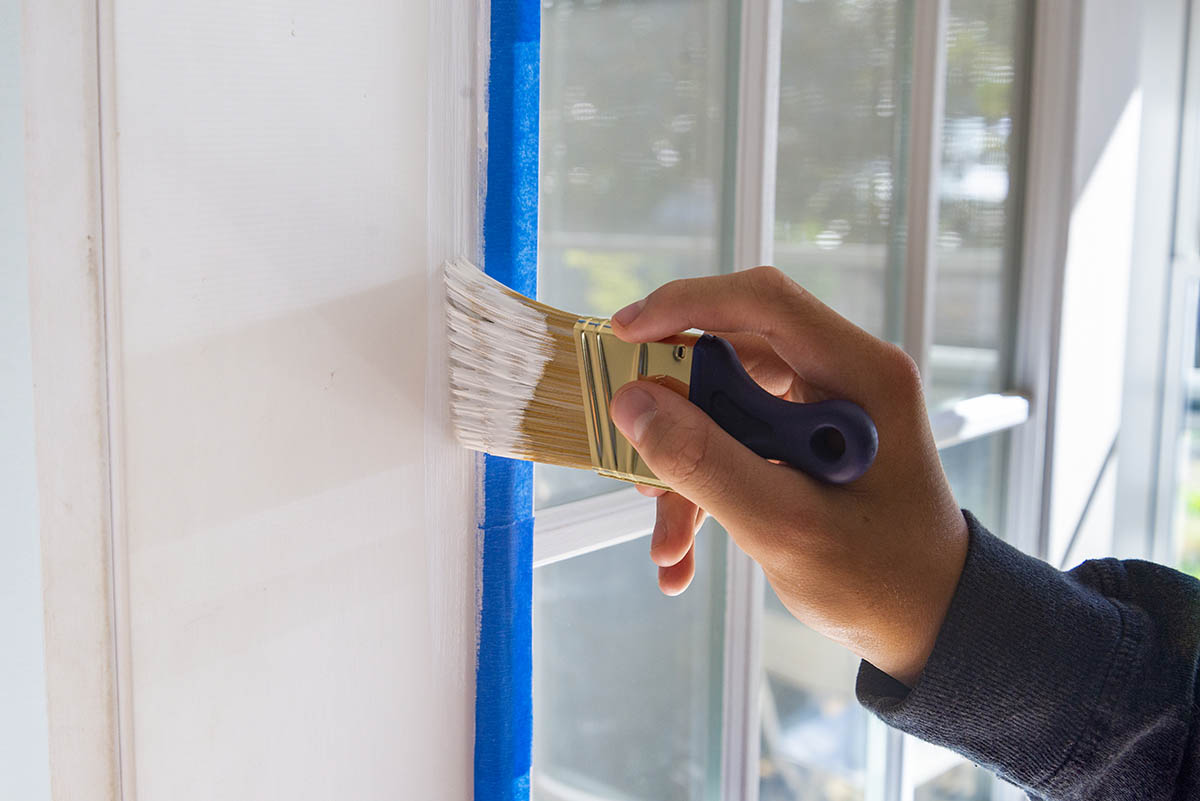
What to Consider When Choosing the Best Paint Brush
Brushes are made of different materials and come in various shapes and sizes to suit specific products and tasks. Here’s how to determine what’s right for your job.
Material
Brush bristles come in two major categories: natural, which are recommended for oil-based paints, and synthetic, which are best for water-based paints.
- Natural brushes are made of animal hair, like hog or badger—fibers with microscopic splits that hold more product to create a smooth finish. Choose a natural-bristle brush when applying oil-based paints and top coats, varnishes, shellac, decorative chalk paint (for an antique look), enamel, and polyurethane. You’ll also get good results using a round, natural bristle brush to apply furniture wax.
- A synthetic brush made of high-quality polyester or a blend of nylon and polyester is better suited to latex (water-based) paint because natural bristles soak up water, becoming limp and less effective. Low- and no-VOC (volatile organic compound) paints, most of which are acrylic latex based, are also best applied with a synthetic brush. Both natural and synthetic brushes can last for years if cleaned and dried thoroughly after every use: Remove excess paint, wash with soapy water, rinse in fresh water, and let it dry on a flat surface.
Size
Paint brushes for house painting typically come in sizes ranging from 1 to 6 inches. Generally speaking, the tighter the area you’re painting, the smaller the brush should be. A 1- to 2½-inch brush is best for window areas, trim, and corners. A 3-inch brush works best for doors, cabinets, and shelving, and a 4- to 6-inch brush is designed for large, flat areas, like walls and ceilings.
Style
There are three main styles of paint brush, each designed for a different purpose and surface area:
- Square cut: A 4- to 6-inch square-cut wall brush is ideal for large, flat surfaces, both interior and exterior. Use a large wall brush for painting walls, flat doors, and siding. With a good-quality wall brush, you won’t need rollers—and you may even save on paint because brushes are more precise.
- Angle sash: This brush was designed to paint window sashes, which fit inside the window frame and allow the panes to move up and down. That said, this short-handled, angled brush is excellent for a variety of detail work because it’s easy to maneuver and offers great stability. Use it for painting grooves, panels, edges, and corners—and to reach around obstacles, like behind a toilet.
- Round sash: These smaller brushes come in a range of sizes from 20 to 40 mm. They are the best paint brushes for decorative painting (like faux finishes) and furniture, like chair and table legs, because the circular arrangement of bristles is conducive to 3D painting.
Quality
A top-quality brush offers smoother, fuller coverage and a perfect finish, and while pricey—depending on brush size and bristle material—it can last up to 20 years. “Flagged” bristles—slightly split at the ends—hold more paint and provide the best coverage. Flex bristle tips to ensure they spring back into shape. Bristles should also be shorter on the outside and longer toward the center, creating precision and control. Finally, bristles should be 50 percent longer than the width of the brush itself to pick up the ideal amount of paint while providing maximum coverage and control.
Our Top Picks
Picking the right paint brush is pivotal for a smooth finish. However, if you want an excellent finish, you need the proper technique in addition to the right brush. Thankfully, we can help you pick out the best paint brush for your project. We tested all our top picks in each category and recommend these brushes to get your paint project done right.
Best for Walls
Purdy XL Swan Flat Paint Brush
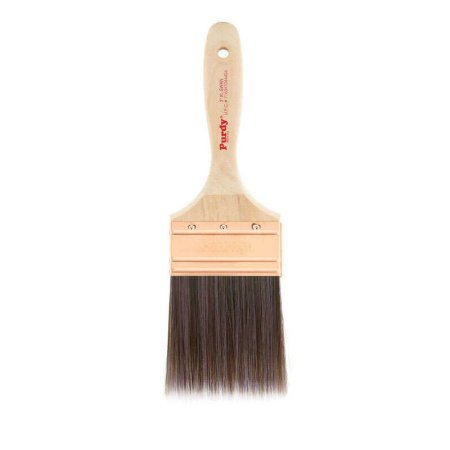
Pros
Cons
Product Specs
- Size: 3 inches
- Style: Square
- Bristle Type: Nylon and polyester
With a blend of nylon and polyester bristles, this brush can handle both indoor and outdoor projects. Purdy’s XL is designed for latex and oil-based paints, stains, and primers. The company states that “Purdy’s proprietary tipping and flagging methodology ensures exceptional paint distribution.” In other words, the high bristle quality will create smooth, full coverage. Tip: Store the brush in its wax-covered packaging after use to return bristles to their original state and fight mold growth.
The brush is a generous 3 inches wide and will provide plenty of coverage on walls. The wood handle is comfortable to hold. We tested the comfort and coverage of the Purdy XL, and it did not disappoint. It’s a solid wall brush that works for painting walls, applying stain on fences, and much more. It’s not designed to get into tight spaces or nooks, but it’s a great paint brush to keep on hand for large paint jobs.
Get the Purdy XL paint brush at Amazon or at Ace Hardware.
Best Bang for the Buck
Purdy XL Elite Dale Sash Paint Brush
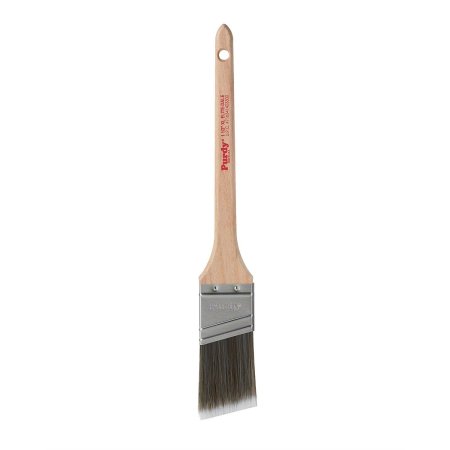
Pros
Cons
Product Specs
- Size: 1.5 inches
- Style: Angled
- Bristle Type: Nylon and polyester
When it comes to trim, molding, windows, and tight spaces, this narrow-angle sash brush, featuring Purdy’s proprietary nylon/polyester-blend bristles, is hard to beat. It’s designed especially for low-VOC paints, which can be thicker than traditional latex paint and harder to apply.
The bristles in the Purdy XL Elite are firm and great for detailed work on trim or slightly rough surfaces. In our tests, the bristles held paint well and evenly distributed the paint across surfaces. The brush is lightweight and feels comfortable in hand. We found that the brush’s long handle made it harder to get into tight areas, but overall, it’s a durable and reliable brush as part of our paint arsenal.
Get the Purdy XL Elite paint brush on Amazon.
Best for Edges
Wooster 2 in. Shortcut Polyester Angle Sash Brush
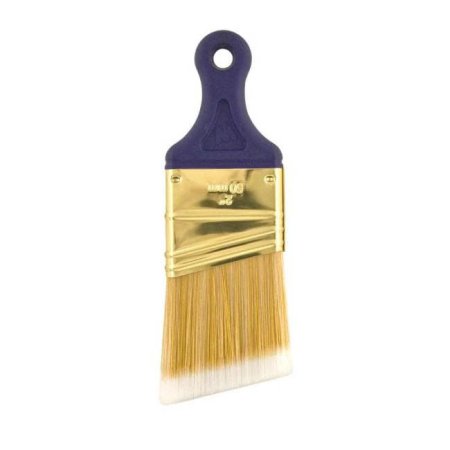
Pros
Cons
Product Specs
- Size: 2 inches
- Style: Angled
- Bristle Type: Nylon and polyester
This short-handled angle sash brush helps create a perfect edge between ceiling and wall and—even trickier!—where two different paint colors meet. The synthetic polyester bristles work with all paint types, especially latex acrylics and water-based stains.
We especially loved the comfortable, proprietary handle design of the brush—it feels like an extension of the user’s hand. We were able to easily control the brush strokes, allowing us to get really close to edges.
Get the Wooster Shortcut paint brush at Amazon or at The Home Depot.
Best for Hard-to-Reach
Richard 80833 Goose Neck Angular Paint Brush
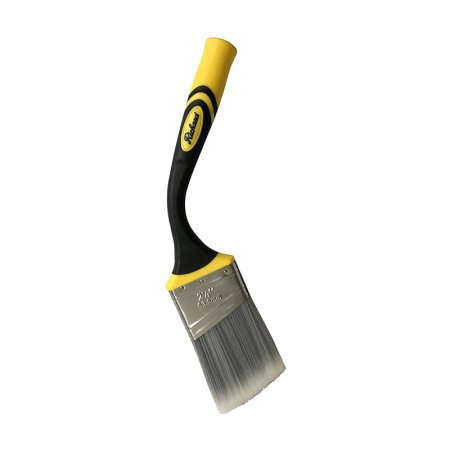
Pros
Cons
Product Specs
- Size: 2.5 inches
- Style: Angled
- Bristle Type: Nylon and polyester
The Richard Goose Neck Angular Paint Brush allows you to reach the edges and corners of high walls without the use of extension ladders or scaffolding. This bendable extender brush can screw onto a painting pole, allowing users to paint high walls above a staircase or to cut in ceiling corners with ease. It’s also great for painting around the baseboard without needing to crouch, bend, or sit on the floor.
We found that the bendable handle on the brush is what makes this tool better than most extender brushes. Once it’s attached to an extender pole, you bend the handle to whatever angle you need and it will hold that angle until you move it again. The brush’s polyester/nylon blend bristles are flexible but still make clean cut-in lines. Its 2½-inch size makes it good for filling in corners.
Get the Richard paint brush on Amazon.
Best Ergonomic
Proform Pro-Ergo 70/30 Blend Angle Sash Paint Brush
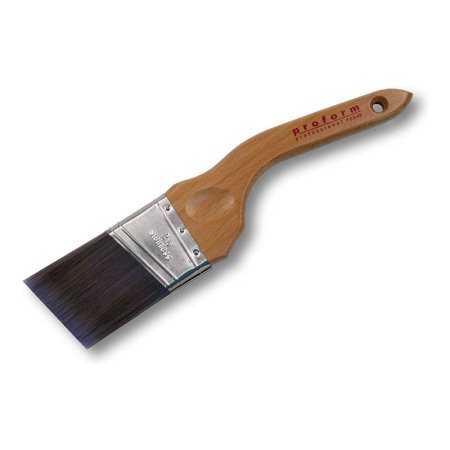
Pros
Cons
Product Specs
- Size: 2½ inches
- Style: Angled
- Bristle Type: PBT filament
Proform broke from the straight-handled paint brush mold with its Pro-Ergo Angle sash brush. Unlike most paint brushes, the Pro-Ergo brush features a curved handle designed to fit comfortably in the palm of the user’s hand. Its generous 2½-inch width and PBT filament brushes make fast work of getting paint on all types of trim.
We did find that it took time getting used to the handle because it was different from all the others we’ve used. But once we did, the ergonomic handle made it much easier to hold the paint brush at a natural angle for cutting in paint. It also reduced hand fatigue, making it perfect for projects requiring many paint cut-ins.
Get the Proform paint brush on Amazon.
Best for Large Areas
Purdy Nylox Swan
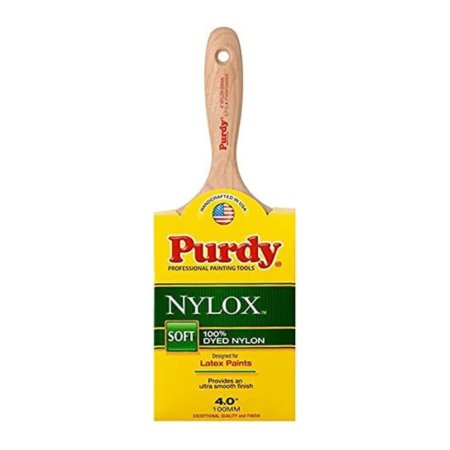
Pros
Cons
Product Specs
- Size: 4 inches
- Style: Soft
- Bristle type: Synthetic nylon
Nylox is one of Purdy’s top-tier paint-brush lines, and the Swan features the same 100 percent black nylon bristles that professionals swear by. For those after a super-smooth finish and who have a large space to cover, this brush can save time and effort.
The soft bristles are designed to apply paint smoothly while minimizing the visibility of any leftover brushstrokes. The brush pickup isn’t amazing, but that’s because if using less paint, it’s less likely to create brushstrokes, which is what this brush is made to avoid. Another great feature of the Purdy Nylox Swan is the smooth hardwood handle, which has a nice taper in the middle that makes it easy and comfortable to grip.
Get the Purdy Nylox Swan paint brush on Amazon.
Best for Trim
PRO 2 in. Trylon Thin Angled Sash Paint Brush
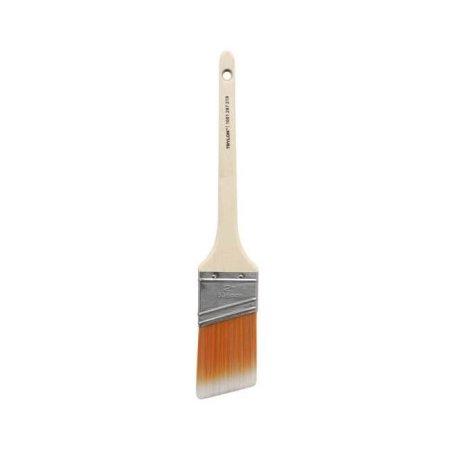
Pros
Cons
Product Specs
- Size: 2 inches
- Style: Angled
- Bristle Type: Trylon filament
The Trylon Thin Angled Sash Paint Brush is a professional-grade brush featuring durable Trylon filament, a synthetic material designed for maximum paint absorption and release. The angled brush features a thinner, tapered handle and is usable with any paint type.
We found the brush to be light and relatively comfortable to hold. The filaments released the paint well and covered a few feet of edge painting before we needed to reload. However, we would argue that the clean edges are the result of a practiced painting technique versus the actual brush. The brush cleans up easily, and the bristles look great after several uses. It’s more expensive than most 2-inch sash brushes, but it’s a good investment for those who paint often.
Get the PRO paint brush at The Home Depot.
Best for Oil-Based Paints
Purdy White China Bristle Sprig 2" Flat Paint Brush
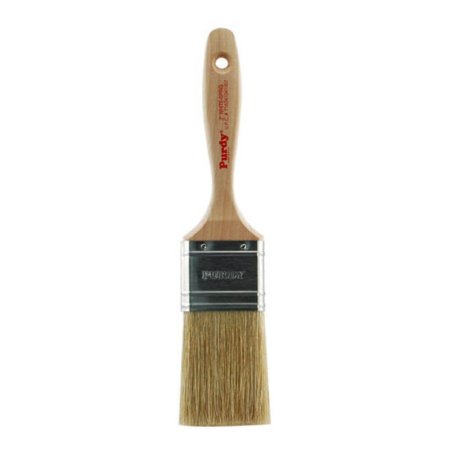
Pros
Cons
Product Specs
- Size: 2 inches
- Style: Square
- Bristle Type: Natural
Natural bristle brushes are perfect for oil-based paints and stains. They are softer and springier, allowing them to absorb heavier paints and stains and distribute them onto surfaces. Purdy’s 2-inch Flat Paint Brush features 100 percent natural white bristles and is constructed with a stainless steel ferrule and a wood handle for comfort and durability.
We found the Purdy Sprig 2-inch flat brush was perfect for applying oil-based products to trim and other wood furniture. This brush is not recommended for cutting in paint around trim because the softer bristles make it harder to paint a straight line. This brush is best used for applying oil-based paints, shellacs, varnishes, lacquers, stains, and sealers to wood. Because its bristles are made from natural fiber, it stands up well to the solvents needed to clean them.
Get the Purdy Sprig paint brush at Amazon and Menards.
Our Verdict
We recommend the Purdy XL Swan flat paint brush and the Wooster 2 in. Shortcut sash brush to take care of most household painting tasks. Both brushes are usable with oil-based and latex paints, are easy to handle, and allow the user to apply paint to surfaces with ease.
How We Tested the Best Paint Brushes
We tested the paint brushes based on size, style, bristle type, comfort, and ease of use. We used the paint recommended for the bristles and applied the paint to walls and trim for each brush. After paint application, each brush was cleaned to determine how fast it was to remove paint from the bristles.
Once clean, we examined the brushes again to determine if any damage was evident to the bristle and handle. When the brushes were completely dry, they were stored in their original packaging and examined a few days later to determine if they retained their shape.
FAQs
There are many types of paint brushes on the market. Although all paint brushes will deposit paint onto a surface, there are brushes designed for specific applications. Using the right brush and paint for its intended purpose will make your painting task more successful. Here are some questions commonly asked about paint brushes.
Q: What type of paint brush gives the smoothest finish?
A softer-bristle brush will give you a smooth finish. However, it’s important to use the correct brush designed for your paint type.
Q: How can I avoid paint brush streaks when painting?
Make sure the brush bristles are designed to work with the type of paint you are using, use proper painting techniques, and paint in the same direction as the wood grain (if applicable).
Q: What is the best paint brush for interior walls?
A wide flat or square style brush is best for wall painting.
